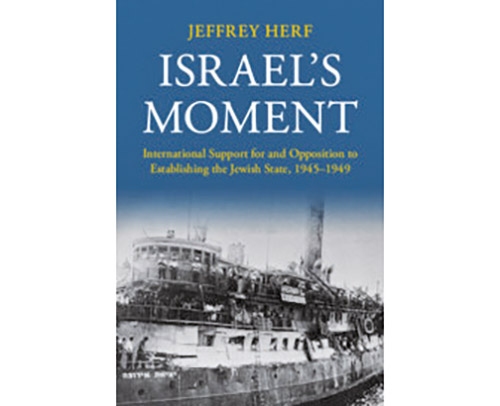

While many may view the establishment of the State of Israel as a miracle that could only have happened with divine assistance, award-winning historian Jeffrey C. Herf shared some of the delicate geopolitics involved in a talk about his book “Israel’s Moment: International Support for and Opposition to Establishing the Jewish State, 1945-1949.” The March 7 event was held by Rutgers University’s Bildner Center for the Study of Jewish Life.
Herf, distinguished professor in the department of history at the University of Maryland, presented research from his forthcoming book. He asserted that the window to establish the Jewish State was remarkably brief and hinged upon the shifting alliances between countries in the shadow of World War II and the Holocaust and the beginning of the Cold War eras. It was also made possible by the Jews of Palestine who were willing to risk their lives for the creation of the state.
Despite the United States voting for the establishment of Israel with a separate Arab state, there was much opposition within the State Department, CIA and Department of Defense, which maintained an anti-Zionist consensus. Led by former Secretary of State George C. Marshall, these leaders viewed the Jewish State as a threat to the region’s oil reserves. Additionally, Zionistic Jews were viewed as threats and assumed to be supportive of communism and as a probable source of Soviet expansion. History has shown that despite the red-baiting connection between Jews and communism, Israel has not served as a Soviet appendage in the Middle East.
One day after the State of Israel was declared, the new country was attacked by her Arab neighbors. The international arms embargo in 1948 and shifting international alliances meant certain doom for Israel were it not for cash-strapped Czechoslovakia, which not only sold desperately needed armaments to the fledgling country (for a price), but also offered to provide training in their use.
Support for Israel began to grow in the United States Congress, as Democratic Senator Robert F. Wagner, Congressman Emanuel Celler and others brought up the Mufti of Jerusalem’s strong support for the Nazi regime and served as a counteraction to Roosevelt’s foreign policy adviser Sumner Welles. On the popular front, Christian Zionists and writers/publishers built support for the state from the general public.
Freda Kirchwey, editor of The Nation magazine, made the case for the Jewish State in the 1940s. Although not friendly to Israel today, The Nation brought Mufti al Husseini’s Nazi collaboration to the public’s attention in an entire issue of the magazine. Although the United States and Britain are considered aligned politically today, that was not the case in the 1940s. Unhappy that British imperialism in the Middle East was on the wane, the British government did not support the establishment of any independent countries in the region and chose to leave the matter to the United Nations. Politically progressive I.F. Stone’s popular weekly publication denounced the British and helped turn public opinion.
As political alliances shifted anew, former first Deputy Premier of Russia Andrei Gromyko and the Ukrainian state supported the establishment of Israel. In the United States, Col. William Eddy, minister to Saudi Arabia, lobbied the Pentagon that Israel was a bad idea that undermined the interests of the United States in terms of oil and would hinder British/American relationships. State Department opposition came from the enormous influence of George Kennan and his support of Soviet containment during the Cold War.
With anti-fascism not yet replaced by anti-communism, the shifting forces and alliances in Europe and the Middle East, and ever-changing public opinion, the vote in the United States was not a sure thing. There was a sliver of opportunity, an open window that was closing quietly and quickly. The wonder is that the state was established at all, and was presented to the United Nations at just the right moment.
Herf’s research was a natural extension of his scholarship in modern European history with a focus on 20th-century Germany, Zionist aspirations and the forging of the Jewish State in the aftermath of the Holocaust.
“Israel’s Moment: International Support for and Opposition to Establishing the Jewish State, 1945-1949” is published by Cambridge University Press. To learn more about the book and to buy a copy, see: https://tinyurl.com/st8sz2k4.
For more information about upcoming Bildner Center events, visit https://bildnercenter.rutgers.edu/.
By Deborah Melman










